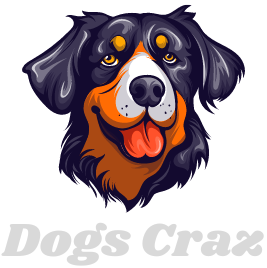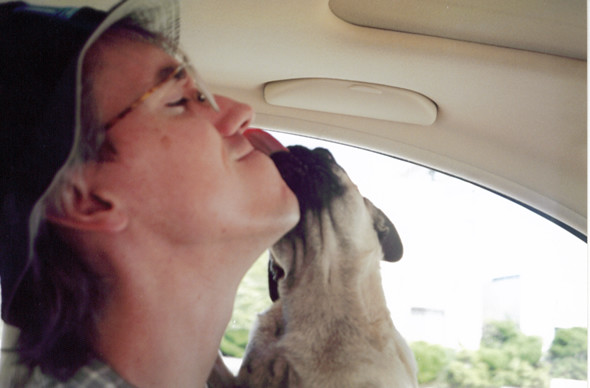Dogs licking their owners’ noses is a common behavior that stems from their innate social behaviors and the desire to establish a peaceful connection. It begins during puppyhood to appease adult dogs and show submission, when dogs lick their owners’ faces, they continue this behavior to communicate their submissiveness and maintain a positive relationship. Dogs use this behavior to bond with their owners, seek attention, and show them that they are loved and respected, though this is frequently interpreted as an expression of affection, it is crucial to realize that dogs may also use this behavior to express stress, anxiety, or a need for privacy. For dog owners and dogs to have a peaceful and courteous relationship, it is crucial to recognize these signs of communication.
The behavior of dogs is influenced by various factors, including genetic predisposition, experience and learning, environment, and physiology Several dog studies have shown that behavior can be inherited to some degree, and maternal influences can affect personality and temperament. The brain and its associated neurotransmitters also play a fundamental role in a dog’s behavior.
Understanding Canine Behavior
Dogs frequently lick their owners’ faces as a result of their natural social tendencies and desire for a calm relationship. Dogs use this behavior to bond with their owners, seek attention, and demonstrate their love and respect for them. Licking is another way that dogs express themselves; it can be used to express submission, fear, or a need for attention. Another crucial component of canine behavior is olfactory communication, since dogs use their keen sense of smell to identify and acquaint themselves with people. Scent marking is another deliberate way that dogs can leave their mark on the environment. Scent marking is a direct way that people can communicate through smell. Understanding these communication cues is essential for fostering a harmonious and respectful bond between dogs and their owners.
Affection and Bonding
Expressing love and affection: Dogs express love through body language, such as a happy tail, perky ears, and loving licks They also respond positively to verbal praise and their human’s gaze, often approaching them or pawing at them for pets. Dogs have their own love language for expressing and receiving affection, and they respond well to acts of love, treats, respect, scratches, rubs, and pats.
Mimicking mother behavior: In dogs, mother behavior is defined by actions like spending time with their puppies, licking and grooming them, and nursing them. This behavior is crucial to the puppies’ survival, feeding, and safeguarding. It also plays a significant role in the bonding process between the puppies and their mother. Maternal attention influences puppy development, and breed, parity, and litter size all have an impact.
Building a closer relationship between humans and dogs can be accomplished through a variety of activities, including playing, grooming, walking, running, exercising, and providing affection and cuddles, it can also be accomplished by sticking to a regular schedule. Giving verbal praise and using their preferred love language is likewise well-received by dogs.
Seeking Attention and Interaction
Dogs frequently express their needs and desires through attention-seeking behavior. To get their owner’s attention, this behavior can involve howling, pawing, jumping, mouthing, or barking It’s critical to realize that anxiety, uncertainty, or a need for social interaction are frequently the driving forces behind attention-seeking behaviors rather than rage or retaliation. It is advised to ignore the undesirable behavior, reward positive substitute behaviors, and enhance the environment to reduce opportunities for attention-seeking in order to address attention-seeking behavior, a harmonious and courteous relationship between dogs and their owners is largely dependent on your ability to recognize and respond to your dog’s communication signals.
Health-Related Reasons
Dogs may lick their owners for a variety of reasons, some of which may be medical Overindulgence in biting may indicate underlying medical conditions like allergies, skin infections, digestive disorders, or neurological disorders. Prior to treating the behavior, it is critical to rule out any underlying medical conditions. Dogs investigate their owners by licking them and that’s a sign of love. It is basically a nature of a pet dog to lick their owner and this is simply because of love. Dogs may also lick their owners excessively if they are experiencing stress or anxiety. If the pet owner is concerned about their pet’s licking behavior, or it continues, they should seek veterinary assistance.
Social Learning
Dogs are known to learn through social learning, which involves observing and learning from other dogs or humans. This method of learning is called the social learning theory and is shared by both humans and dogs. Dogs can learn new activities and understand old behaviors through observation. Puppies, in particular, display allelomimetic behavior by mimicking activities they observe in adults, which results in the pack, including humans, growing closer together. Social learning is also used in dog training, where a well-trained mentor dog can show a less trained dog how to behave, leading to fast and effective learning of new skills, habits, or behaviors. Research has shown that dogs, even at a young age, are able to acquire socially information and learn from both specific and human demonstrators, endorsing their flexibility in learning from different social partners.
Conclusion
Recap of various reasons why dogs lick their owners’ noses
Dogs lick their owners’ noses for various reasons, including:
- Expressing Affection: Dogs use licking to bolster their relationship with humans and voice their love.
- Seeking Attention: A dog may exhibit this behavior to indicate that they desire to play, take a walk, or just spend time with its owner.
- Displaying Submission: By licking the owner’s face, you can respect their authority and uphold social harmony.
- Eating and Investigating: Dogs lick to discover the people and places they live in.
- Signaling Anxiety or Stress: Overindulgence in licking may indicate a medical issue in addition to being a sign of anxiety or stress.
Emphasizing the importance of understanding canine communication
Knowing the subtleties of dog licking can improve the relationship between owners and their pets tremendously and provide information about the emotional and physical health of the dog, it’s a crucial component of dog communication that, when read correctly, can disclose a lot about the motivations and inner state of a dog.
Encouraging positive interactions for a healthy human-dog relationship
To give our dog companions the love and care they deserve, we must acknowledge and respect the different licking behaviors as forms of communication. Positively responding to these cues can help meet your dog’s social needs and keep them from becoming lonely or bored, which will eventually lead to the development of a stronger and more intimate bond between you and your pet.

